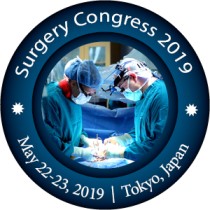
Devid Ruru
Brawijaya University, Indonesia
Title: Gastroschisis: Experience in RSSA during the period of 2015-2016: Descriptive study
Biography
Biography: Devid Ruru
Abstract
Gastroschisis is among the most common structural birth defects and its cause remains unknown. The phenomenon of increased prevalence has been reported and continues to be a stimulus for epidemiologic evaluation of risk factors, both maternal and environmental. This study seeks to proï¬le infants with gastroschisis admitted to RSSA during the period of January 1st 2015 until December 31st 2016. The design of the study is a descriptive research design with samples of all gastroschisis patients treated at RSSA during the period January 1, 2015 until December 31, 2016 who met the inclusion criteria those patients who undergo therapy to completion. The medical records of samples collected and then do the recording of the variables studied. Results showed patients with gastroschisis occurred in 57% of men, 71% primigravida, 64% of term baby, 79% of low birth weight, average treatment duration of 8 days, the average length of stay of 9 days, the average maternal age 22.3 years, 93% were staged closure, 86% had a combination of antibiotics ampicillin, sulbactam and gentamicin, 93% died of sepsis. The conclusion of this study is gastroschisis patients are predominantly male, young maternal age, primigravida, term baby, have a low birth weight, staged closure performed to almost all patients. The most common antibiotic given was ampicillin sulbactam combined with gentamicin. The mortality rate is 100% with sepsis as the main causes of mortality, mostly cared for less than three days before died and most have a length of survival less than five days. Recommended for women at high risk of doing the ANC to a place with more comprehensive facilities, in addition, it is necessary to do blood cultures in all patients with gastroschisis complicated by sepsis.

